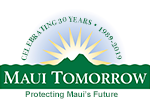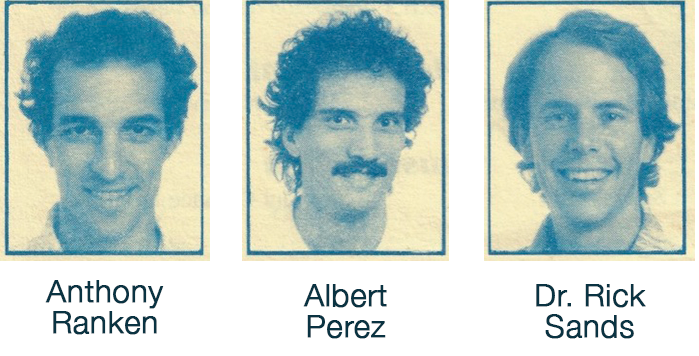Maui Tomorrow, as its name implies, usually looks to the future, always working to preserve the best of Maui and improve our quality of life for the future. The organization has been doing this for over three decades.
Now Maui Tomorrow is reflecting on how it got to where it is today. It will examine its own past, its organizational transitions, and its most important activities and major accomplishments over the past 30 years.
Several members of our community have been involved with Maui Tomorrow’s efforts for many years, and will be interviewed to reflect on their recollections of the formation of the organization, its purpose, its participation in the many changes that have taken place on Maui, and the threats that were prevented from happening.
What would Maui Island be like today if Maui Tomorrow had not participated so actively? What are the group’s biggest accomplishments, and what have been major disappointments?
Maui Tomorrow Foundation, Inc. had its beginning in the late 1980s when Oneloa (Big Beach) was being threatened by condominium development. Residents felt that this would be a gross desecration of a Maui treasure and took action. Maui Tomorrow built upon the momentum that had been developed by its predecessor group, State Park at Makena (S.P.A.M.), and was successful in stopping the development; a petition signed by thousands of Maui residents helped to convince the Hawaii Legislature to acquire the beach and its adjacent lands, thus creating Mākena State Park.
Building on that initial success, Maui Tomorrow’s founders began to address other threats to Maui’s well-being. This oral history project will examine those initial efforts, and examine how a small, involved group of residents established an effective organization that has played a pivotal role in protecting Maui for future generations.
Maui Tomorrow plans to interview people who have been involved in major issues over the years, including stopping the Hawaii Superferry and validating the need for complete environmental impacts; the lengthening of Kahului Airport’s runway (which would have allowed direct international flights); Maui Electric’s effort to build an additional fossil fuel power plant; the diversion for over a century of East Maui stream water; the effort to build a large community in Olowalu adjacent to Maui’s largest intact coral reef; and many other projects.
In addition to working on specific projects, Maui Tomorrow has been involved in improving the County’s planning process and in creating better community plans.
Some of the people who will be interviewed include: Mark Sheehan, Lucienne de Naie, Dick Mayer, and Irene Bowie. Of special interest will be interviews with Maui Tomorrow’s three co-founders: Dr. Rick Sands, Anthony Ranken, and Albert Perez (who presently serves as Maui Tomorrow’s Executive Director).
The interviews will be made available on the Maui Tomorrow website, so that people can learn more about Maui’s history of citizen involvement in protecting the ʻāina over the past three decades.
We will let you know when they are available and how to access them.




